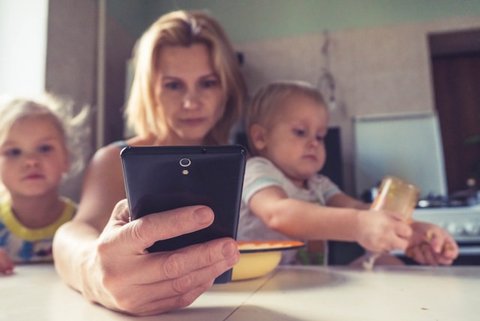
29 Aug EdSource: How Parents Can Limit Children’s Harmful Cellphone Use at Home

Don’t want your kids spending too much time looking at screens? You shouldn’t be either. (Photo by Vitolda Klein on Unsplash)
By Diana Lambert
EdSource
Children who use cellphones, smartwatches and other personal devices excessively are more likely to have shorter attention spans, be more anxious, have trouble thinking critically, be less physically fit and have problems interacting socially, according to research.
The debate about how much screen time is too much has been ongoing for more than two decades, but it has gained urgency in recent years as young people have become more reliant on cellphones and other devices.
The use of personal devices increased during pandemic school closures, with 12- to 13-year-olds more than doubling their recreational screen time to 7.7 hours a day in 2020, according to research led by the University of California San Francisco.
Adolescents have since decreased the number of hours they are on the phone, but cellphone use is still well above pre-pandemic levels, said Dr. Jason Nagata, an associate professor of pediatrics at UC San Francisco.
California Gov. Gavin Newsom brought the issue to the forefront earlier this month when he urged school district leaders to take immediate action to restrict cellphone use on campuses this school year. Newsom said excessive cellphone use by young people is linked to anxiety, depression and other mental health issues.
Cellphones, smartwatches and other personal devices aren’t inherently good or bad, Nagata said. They can be a useful tool for communication, education and socialization, but they also have their dangers, he said.
“The goal of parents and for teens is really to try to optimize all of the benefits, while really minimizing the risks,” Nagata said. “And, I do think that one of the risks associated with constant connection on phone use is that some teenagers and adults really can develop signs and symptoms of an addiction.”
Up to 95% of young people ages 13-17 nationwide report using social media platforms. A third say they use it “almost constantly,” according to the Office of the Surgeon General.
“If kids are on their phones 24/7, it doesn’t help them develop a sense that they can create, understand and generate thoughts and ideas,” said Dr. John Piancentini, a psychologist and professor at UCLA Health on its website.
Too much screen time can be bad for kids
Excessive cellphone use can impact a child’s mental health, resulting in anxiety and sometimes disruptive behavior disorders, according to research. Teens who use social media too much can develop body image issues and eating disorders, Nagata said.
Others may feel less connected to friends and family.
Excessive phone use also has potential health consequences. One of the primary ways that phone use can adversely affect a young person’s health is by displacing sleep, which is essential to health and development, Nagata said. The blue light emitted by cellphones and other devices can suppress melatonin, a hormone that helps a person to sleep.
Cellphone sounds, such as notifications and rings, can also disturb rest. Sleep is important for teenagers in particular. Research shows that one-third of teens already get fewer hours of quality sleep than is required for optimal growth, development and academic achievement, Nagata said.
>>>Read: Why I Deleted TikTok From My Phone and My Life<<<
Young people who excessively use cellphones are also more likely to have sedentary lifestyles and to focus on the screen instead of what and how much they are eating, he said.
Increasingly, school districts are banning cellphones and other personal devices to keep students focused on school work and to encourage them to interact more with their teachers and peers. But what can parents do to ensure their children have a healthy relationship with their cellphones and other devices?
Warning signs of addiction
There is no consensus among researchers or physicians about exactly what constitutes phone addiction or problematic phone use, Nagata said. Despite that, the issue has become dire enough for Surgeon General Vivek Murthy to issue an advisory in May, calling on policymakers, technology companies, researchers and families to minimize the harm of social media and to create safer, healthier online environments to protect children online.
>>>Read: My Generation Is Addicted to Social Media<<<
“I think, in general, parents and kids have a sense that maybe their use is too much, maybe it’s leading to problems at home, maybe it’s leading to problems at school,” Nagata said. “And so those might be indications that someone has problematic phone use or a phone addiction.”
Nagata said there are a few indications that your child may not have a healthy relationship with their phone:
- If they are upset at the thought of being without their phone.
- If they stop whatever they are doing to answer calls, texts or messages.
- If they argue with others over the amount of time they are on the phone.
- If they can’t reduce the amount of time they are on their device.
- If time on the device interferes with schoolwork, chores or in-person socializing with family or friends.
Parents can limit phone use
Decreasing the use of cellphones and other devices before adulthood can be particularly important because research shows that screen-use patterns in young adulthood persist through adulthood.
Tips to decrease screen time:
- The American Academy of Pediatrics recommends having a family media use plan that outlines when phones can be used and when they can’t.
- Initiate screen-free times before bedtime so that children get enough sleep. Parents could consider prohibiting screens in the bedroom and turning off devices and notifications at night.
- Establish that dinner and social times are screen-free times to better promote conversation and socialization.
Parents should have regular conversations with their children about screen use and find opportunities for children to put away their phones and do nonscreen activities with friends.
Parents should try to work with the parents of their children’s friends to institute similar rules on social media and screen use to make implementation easier.
Parents should adhere to the family media plan and model good cellphone practices.
“The biggest predictors of children’s screen use are their parent’s screen use,” Nagata said. “It’s really important to practice what you preach.”
Parental monitoring and limiting of adolescent screen use were both linked to lower adolescent screen time, according to UCSF research. Punishing adolescents by taking away their devices or rewarding them with more screen time was not effective, Nagata said.
“There is not a one-size-fits-all solution for screen rules, so parents should consider their children’s ages, what electronic devices are in the household, and the family’s needs for communication and school work on electronic devices when constructing a family media use plan,” Nagata said.
Copyright © 2024 Bay City News, Inc. All rights reserved. Republication, rebroadcast or redistribution without the express written consent of Bay City News, Inc. is prohibited. Bay City News is a 24/7 news service covering the greater Bay Area.






No Comments